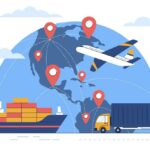
In an increasingly interconnected global economy, the importance of strategic export controls cannot be understated. As nations seek to protect their national security interests and promote ethical trade practices, export control organizations play an essential role in regulating the flow of sensitive technologies and goods across borders. One of the key components of this regulatory framework is the licensing process, which ensures that exports align with national and international security obligations.
Recent reports and data compiled by various export control organizations highlight the complexities and nuances involved in export licensing. Understanding these licensing processes is crucial for businesses operating in sectors that deal with controlled materials, technology, and information. This blog post aims to provide insights into the current landscape of strategic export controls and the vital role that licensing data plays within it.
Export controls are designed to prevent the proliferation of dual-use technologies—those that can serve both civilian and military applications. Governments routinely assess items based on their potential use in sensitive sectors; this can include anything from advanced computing systems to biochemical products. The licensing process acts as a checkpoint, ensuring that only those exports deemed appropriate and compliant with regulations are permitted.
Licensing data serves as a valuable resource for businesses and policymakers alike. Reports generated from export control organizations typically provide insights into the number of licenses issued, the types of commodities involved, and the geographic regions most affected by these controls. This data can uncover trends regarding what is receiving greater scrutiny, revealing how geopolitical dynamics influence export decisions.
For businesses, access to licensing data goes beyond mere compliance; it can inform strategic decision-making. By understanding which products require licenses and what regions are more heavily monitored, companies can tailor their market entry strategies and risk management processes accordingly. Additionally, understanding licensing requirements can enhance a company’s reputation as a responsible trade partner, aligning with both international standards and consumer expectations.
Furthermore, export control organizations continuously adapt their licensing frameworks in response to evolving technological landscapes and changing security concerns. Keeping abreast of these changes is crucial for businesses to ensure they remain compliant and competitive in the global marketplace. Reports detailing emergent trends and updates in licensing procedures can provide businesses with the tools necessary to navigate these challenges effectively.
In conclusion, strategic export controls and licensing data play a pivotal role in the governance of international trade practices. For organizations engaged in exporting controlled items, understanding the intricacies of the licensing process is not only a regulatory necessity but also a vital component of strategic planning. As global dynamics continue to evolve, staying informed about licensing data will enable businesses to thrive in a landscape governed by complex compliance requirements.
指导:战略出口管制:许可数据
由出口管制机构编制的出口管制许可的报告和数据。
在全球化日益加强的今天,出口管制的作用日益凸显。出口管制组织通过收集和分析出口控制许可的报告和数据,为政策制定者、企业以及研究机构提供了重要的信息支持。本文将对出口管制许可的相关报告与数据进行深入探讨,揭示其对国际贸易和国家安全的影响。
首先,我们需要明确什么是出口管制。出口管制是指政府对特定物品、技术和服务的进出口进行限制和控制的机制。这种控制措施通常是出于国家安全、外交政策和国际合规的考虑。
出口管制组织搜集的数据包括申请的数量、类型、审批周期及涉及的国家和地区。这些数据不仅为监管机构提供了统计基础,也为出口商提供了市场洞察。通过分析过去几年的数据,我们可以发现一些趋势。例如,某些高科技产品的出口申请越来越频繁,而某些国家对出口管制的要求则愈加严格。
数据表明,在当前国际形势下,部分国家加强了对先进技术的出口限制。这些限制主要集中在人工智能、半导体和生物技术等关键领域。出口管制组织的报告显示,这不仅会影响相关行业的出口业绩,还将促使企业调整自身的研发与市场策略。
此外,出口管制的透明度也在逐步提升。出口管制组织不定期发布的报告,提供了出口许可的详细信息,使各方了解哪些产品受到限制、哪些国家属于高风险地区等。这种透明度有助于提升企业的合规能力,降低因违反出口管制法规而导致的潜在风险。
总的来说,出口管制许可的报告与数据在促进国际贸易合规、保障国家安全以及指导企业策略方面发挥着不可或缺的作用。随着全球环境的变化,各界对出口管制的关注度也将持续加深。了解并利用好这些报告与数据,无疑将为参与国际贸易的各方提供重要的决策支持。


















 Our Collaborations With
Our Collaborations With 







